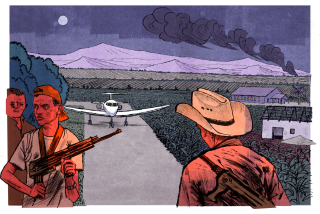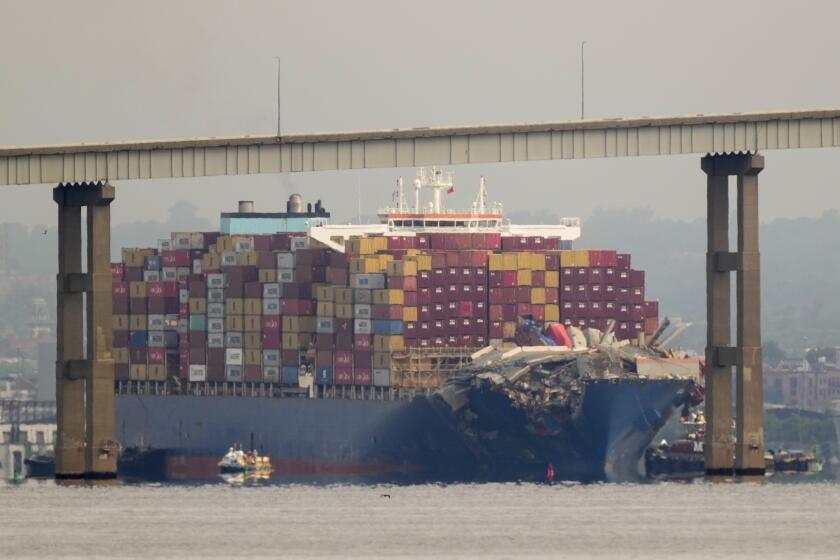Ex-Colleagues Ask Help Solving Mexican Attorney’s Death
MEXICO CITY -- Trying to breathe new life into an inquiry growing colder by the day, former colleagues of human rights attorney Digna Ochoa renewed an appeal Friday for international help in solving her shooting death, which occurred one year ago today.
Edgar Cortez, Ochoa’s onetime colleague and now director at Miguel Agustin Pro Human Rights Center here, said that without help from outside forensic specialists and criminologists, the investigation faces “the risk of becoming just one more unresolved case in this country.”
Cortez announced that his organization had withdrawn from the investigation, and complained that the case had dragged on without resolution. He spoke at a news conference to mark the anniversary of the shooting.
The Mexico City attorney general’s office, which in August appointed its third special prosecutor to head the high-profile investigation, has admitted that the case has been mishandled. But the current prosecutor, Margarita Guerra y Tejada, said Thursday that she is committed to bringing it to a transparent end.
The Inter-American Commission for Human Rights, a unit of the Organization of American States, agreed in June to send a forensic team to review evidence in the case, Cortez said. But the team has yet to arrive because of a dispute over who should pay for the review and because of questions over whether its findings would be valid in a Mexican court, sources close to the case said Friday.
The commission met in Washington on Friday to review the Ochoa case and others, but it was not immediately known whether it had decided on any action. Guerra y Tejada spoke at the hearing.
Ochoa’s body was found in her office, kneeling and slumped over a sofa, with point-blank shots to her head and leg. Her pistol was on the floor beneath her. A letter placed nearby threatened others in her human rights office “if they continue.”
The death of the 37-year-old former Roman Catholic nun was initially described by government officials as a political murder and framed in the press as a test for President Vicente Fox’s promise to do away with gangsterism and impunity.
Ochoa had made an ample number of enemies and drawn many death threats because she had defended left-wing guerrillas and students, as well as ecologists who had sought to block illegal deforestation in Guerrero state. The year before her death, Ochoa had received the American Bar Assn.’s Human Rights Award, honoring her for courageous legal defenses.
Her murder case took a twist last spring when Mexico City officials told reporters that investigators were working on the hypothesis that Ochoa was emotionally disturbed, had falsified death threats and committed suicide. That theory enraged members of her family.
At the Friday news conference, Cortez said that his organization did not have a position in the suicide-versus-murder debate, only that it wanted the government to solve the case.
In the text of her remarks at the Inter-American Commission on Human Rights hearing, Guerra y Tejada acknowledged that evidence in the case had not been properly handled.
“Some witnesses called to declare did not do so with clarity and specificity,” the prosecutor said, adding that a psychological profile of Ochoa prepared by the prosecution team contained “deficiencies.”
In a telephone interview Thursday, Guerra y Tejada said that no line of inquiry would be discarded. She added that 20 witnesses had been called since she took over the case and that 30 more were due to testify.
She hopes to bring the case to a close in a matter of months.
“I’ve had very little time on this case,” she said. “I was named in August, but have only been fully involved for a month. At this point, this is not so much a case of analysis as it is of deciding what evidence is useful and what isn’t. I have no opinion whether it was a homicide or suicide. We’re still looking at the evidence ... and calling witnesses.”
But Jesus Ochoa y Placido, a brother of the victim, said Thursday night that he feared that Guerra y Tejada was following the same “false line” of investigation as previous prosecutors because she had asked him and his brother Ismael to supply saliva samples to her office.
If the samples match those on envelopes containing the death-threat notes that his sister said she received, it would bolster investigators’ earlier claim that Ochoa had falsified the threats.
More to Read
Start your day right
Sign up for Essential California for news, features and recommendations from the L.A. Times and beyond in your inbox six days a week.
You may occasionally receive promotional content from the Los Angeles Times.






